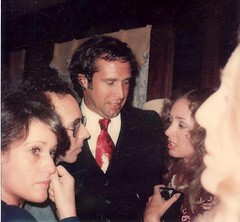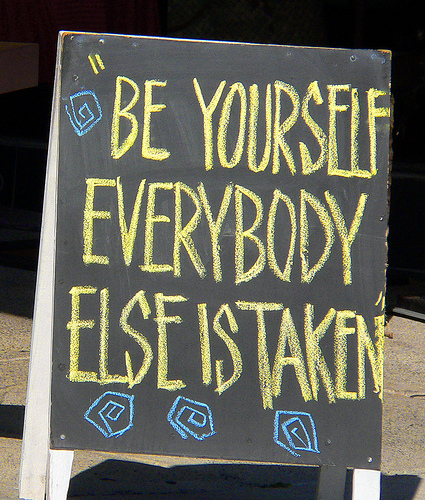In the grand search for well being and happiness, our sense of identity plays a starring role. We grapple with three major questions:
- Who am I?
- How did I come to be?
- Where is my life going?
The best way to take on these behemoths is by "constructing and internalizing a life story," according to eminent developmental psychologist Dan McAdams and a host of research in support of his theory.
In other words, we figure out who we are by writing a nonfiction narrative starring yours truly.
How Meaningful Life Stories Relate to Well Being
You've been naturally writing your life story since you were an adolescent, when you first became able to identify themes and causation in your personal tales: "That guy I'm crushing on ignored me because my jeans are so Goodwill. That's just like last year, when mom made me wear those hand-me-down Keds."
As you can probably remember, adolescent stories aren't exactly meaningful.
That's why our twenties are all about figuring out who we are in a way that matters. It's no small task: when we make meaning from our life stories, we enjoy greater psychological well being and higher self-understanding, compared to people with life stories that have little to no meaning.
"Through meaning making, people go beyond the plots and event details of their personal stories to articulate what they believe their stories say about who they are. Storytellers may suggest that the events they describe illustrate or explain a particular personality trait, tendency, goal, skill, problem, complex, or pattern in their own lives. In making meaning, the storyteller draws a semantic conclusion about the self from the episodic information that the story conveys." - McAdams and McLean
Given that making meaning from our personal narrative creates well being, the obvious question is how can we make meaning from our life stories? Here are five research-based answers.
1. Don't Just Tell Stories for Entertainment
Barstool stories are fun and definitely have their place in our lives (I, for one, wouldn't want to be around someone who is constantly trying to extract meaning from their life stories...which is perhaps why I married my opposite!). If you get hooked on only telling personal anecdotes to get a laugh instead of explaining yourself, you're less likely to create meaning and experience high well being.
Two of my friends come to mind. They always had an elaborate, hilarious anecdote to share for all gathered around, and gatherings weren't the same if they weren't there. These same people were deeply unhappy and dissatisfied with life, however, which you'd only discover if you happened to catch them alone. Perhaps this is one reason why comedians have high rates of depression.
Action Step: Balance your entertaining anecdotes with explanatory anecdotes - and make sure to cultivate friendships that let you share each.
2. Emphasize Your Ability to Control Your World
This is a biggie. If you can reconstruct your life stories to emphasize how much control you have over your world, the more well being you'll experience. In fact, studies show that rewriting your personal narrative to have more self-mastery, empowerment and achievement - aspects collectively called "agency" - is precisely what makes psychotherapy effective. I call this the "Becoming the Hero in Your Own Story" effect.
"Increases in personal agency preceded and predicted improvement in therapy. As patients told stories that increasingly emphasized their ability to control their world and make self-determined decisions, they showed corresponding decreases in symptoms and increases in mental health." - McAdams and McLean
Action Step: Consider how you're telling your life stories. Are you the victim in them, or are you active and impactful? If the former, be the editor of your life tale and rewrite that sucker. ASAP.
3. Consider Whether Friends & Family Accept Your Life Story
The following finding fascinates me:
"When important people in a person’s life agree with his or her interpretation of a personal story, he or she is likely to hold on to that story and to incorporate it into his or her more general understanding of who he or she is and how he or she came to be." - McAdams and McLean
This speaks volumes about the influence of our family, close friends, and significant others on our well being.
It also begs the question: if the important people in your life don't agree with how we interpret our life stories, are we supposed to ditch them? Since research clearly shows that social integration is key to well being, that probably isn't the best choice. That said, I do believe in pruning friendships that consistently bring more misery than support, and friends' acceptance of your life stories may be one indicator of friendships that have run their course (or were a bad choice from the start).
Action Step: From here on out, actively choose friends and significant others who accept and confirm your interpretation of your experiences. It's your story, after all. Don't let anyone else be the author of your narrative.
Important caveat: you do NOT want to surround yourself with people who accept your stories if they're full of "why me?" and "life is horrible" - these stories need to be challenged. But if you're telling thoughtful life stories, you shouldn't feel attacked and challenged. Period.
4. Identify the Redemption in Your Stories
Another way to create well being is to find the good in the bad. Psychologists call these a "redemption sequence" and they're important:
Redemption sequences "may sustain the hope or confidence that is needed to weather short-term setbacks while reinforcing long-term commitments to improving the lives of others." - McAdams and McLean
It may be impossible to find the "silver lining" while withstanding a hard time; in fact, feeling the full intensity of negative emotions in the moment may enhance well being. But once the moment has passed, do the hard work of making meaning, one element at a time.
Action Step: After a negative life event - such as an illness, loss or disppointment - make an effort to find the good that arose from the hard time. For instance, are you closer to your family, or know something new about yourself, or feel like you can take on different challenges in the future?
5. Find Attentive Listeners
Finally, studies show that "attentive and responsive listeners cause tellers to narrate more personally elaborated stories compared with distracted listeners." This matches Point #2's take on psychotherapy's effectiveness.
Simply having a designated listener who reflects your feelings and asks clarifying questions can help you create meaning from your life story and find greater well being.
Action Step: Identify the friends and/or relative who consistently act as attentive listeners for your stories and make an effort to spend more time with them. You could also turn to a life coach, psychotherapist, or other professional. No matter how you find it, make sure you're being heard. It's the only way you'll hear yourself.
Now I Want to Hear From You
What do you do to create meaning from your life story? Or when have you actively changed your life story, and why did you do it?
What you have to say could make a big difference in another reader's life, so please share!
Source: McAdams, D. P, & McLean, K. C. (2013). Narrative Identity. Current Directions in Psychological Science, 22(3), 233-238.
Related articles
Chevy Chase was the life of the party, but behind closed doors he suffered debilitating depression. (Photo credit: Alan Light)
You'll hear yourself best with an attentive listener at your side. Photo Credit: Leonard John Matthews












